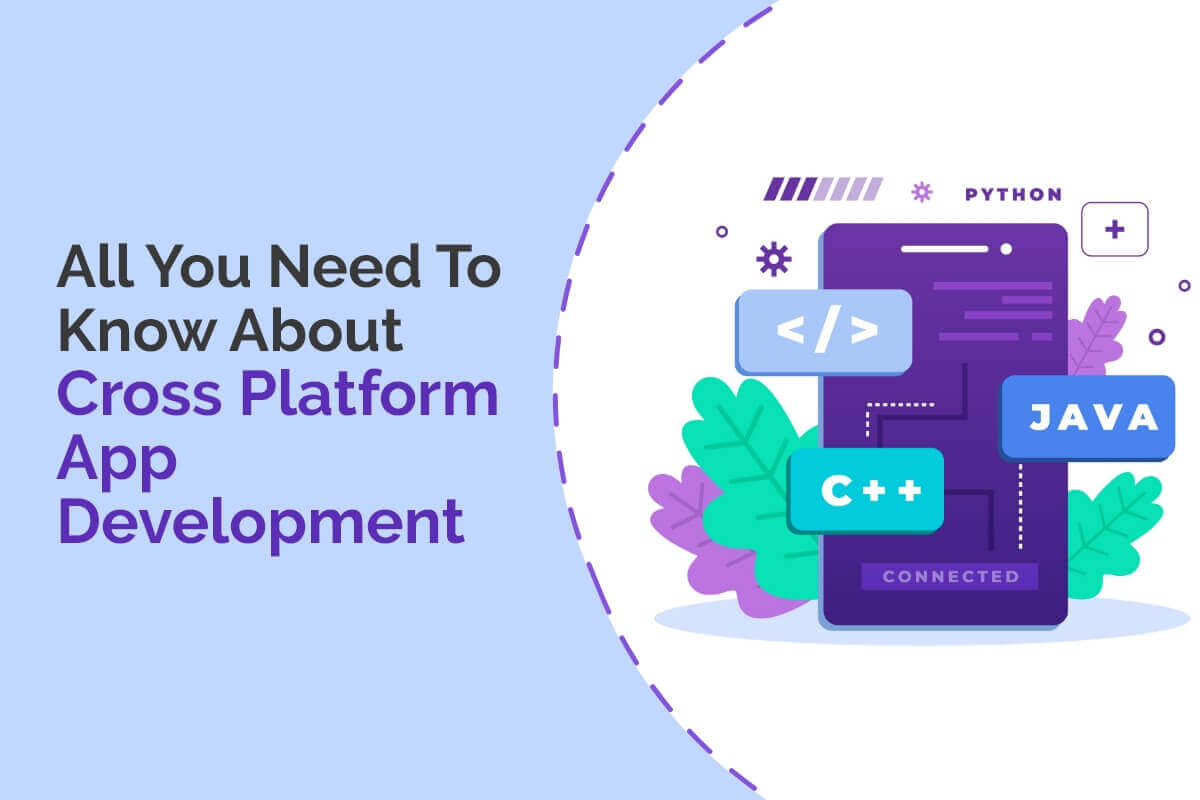What Exactly Is Cross-Platform Application Development?
Cross-platform mobile app development, also known as hybrid mobile app development, is a strategy that allows developers to design a mobile solution compatible with many OS and platforms simultaneously (Android, iOS, and Windows). Developers and firms develop a cross-platform app or outsource it to save mobile app development costs and time.
The Benefits and Drawbacks of Cross-Platform Mobile Development
Below are the pros and cons of cross-platform mobile application development:
Benefits
Broad Market Coverage
While we all have favourite mobile operating systems, don’t let personal preferences stand in the way of your company’s success. By making your mobile application available to both Android and iOS users, you’re laying the road for future income growth.
One Codebase
The cross-platform technique, as the name implies, allows you to build code that supports many operating systems at the same time. Using a single codebase will surely have an impact on all phases of the software development process by allowing you to save money on maintaining and upgrading two independent sets of code.
Faster and Less Expensive Deployment
Although only one codebase is required, cross-platform app development requires developers or a mobile app development company to consider how to properly handle OS differences such as UI or platform-specific store publication methods. At the same time, one cannot dispute that this strategy will shorten the time between drawing and launch.
Workload Reduction
If you choose cross-platform mobile development, you will require lesser resources. You’ll especially appreciate this benefit if you’re outsourcing IT personnel because the cross-platform approach necessitates a smaller crew.
Platform Reliability
There’s no denying that the UX and UI of Android and iOS are vastly different. Most of these differences are addressed by default in cross-platform mobile app development, making design and navigation discrepancies less likely.
Drawbacks
Performance Decrease
Cross-platform programs are easier to deploy; nevertheless, in some cases, they may perform slower than their native counterparts. If you want to create a mobile game or an app with a complicated video chat, for example, React Native or Flutter will not perform as well as native technologies.
Disparities in UX and UI
Another issue is with the graphical user interface. When comparing Android and iOS apps, you’ll note that they differ in terms of navigation, buttons, menus and so on.
Consider Cross-Platform Mobile App Development Frameworks:
- React Native: According to the 2021 Stack Overflow Survey, 16.48% of professional developers chose React Native as the framework they’ve used the most recently, ranking it fifth among non-web frameworks.
- Flutter: Flutter: With over 135k GitHub stars and 68.17% of programmers naming it one of the most popular frameworks in the 2021 Stack Overflow survey, Flutter appears to be outperforming React Native and is unquestionably a force to be reckoned with. Its versatility extends to e-commerce solutions like Flutter WooCommerce, leveraging its robust framework for seamless app development.
- Xamarin: This open-source framework was founded in 2011, making it the oldest on this list, but it didn’t gain traction until it was acquired by Microsoft five years later. It now has a community of over 60 thousand contributors.
Also, read the blog post on Top Flutter Trends
Steps to Outsource Mobile App Development:
Are you wondering how to outsource app development? Check the below points:
1). Establish Your Requirements
We propose beginning with a business plan when you have a concept that you want to develop into a reality. A business strategy will assist you in analysing your needs, evaluating your options and understanding what you want from your outsource mobile app development partner.
2). Make a List of the Top Mobile App Development Company
Finding and hiring the right outsourced app development provider is always difficult. We have a few pointers to help you make an informed decision:
- Check Out Outsourcing Companies on Upwork: Upwork is an excellent location to seek contractors since it provides a lot of information.
- Examine the Review Websites: First and foremost, you should go to Clutch and GoodFirms. Clients can submit detailed reviews and discuss their experiences working with an outsource mobile app development partner on these platforms.
- Search Companies that Specialise in your Field: If you want to create an Internet of Things product, search for “top mobile app development company” and so on. By taking this strategy, you can ensure that your technology partner has the necessary capabilities and can assist you in developing the greatest product on the market.
- Request Recommendations: One of your connections has most likely dealt with app development outsourcing ask them for recommendations.
3). Portfolio Evaluation
A trustworthy organisation is always willing to share its portfolio. But, if you’re a non-technical entrepreneur, what should you search for? We have some more suggestions for you.
- Consider the Quantity and Complexity of Completed Work: What’s the use of having over 200 completed projects if they’re all template websites? Find projects that are similar to yours. Any e-commerce project is relevant if you intend to create a marketplace.
- Demo Versions are Available: An outsourcing agency should be able to provide access to a demo of an application, in addition to a brief explanation of the applications they’ve produced. Test it out.
- Examine the Live Products of the Company: Are the company’s web and mobile applications accessible to a large number of people? Request links, install apps, and get a sense of how your final project may look. Is it of the expected calibre?
- Check out these GitHub contributions: You’ll need some basic programming skills or a friend that can assist you with evaluation for this. Examine the code created by a company’s developers or firm providing types of mobile app development services and determine whether it meets your requirements.
4). Select a Pricing Strategy

Budget discussions for outsourcing cross-platform app development are difficult. However, it is critical to employ a win-win strategy. First, you must choose between a time and materials model and a fixed price model.
- Fixed price: This strategy is only practical if you have specified product specs and are confident they will not change. In this instance, you can agree on a definite price and a specific deadline and start the work. When working with an offshore company, fixed pricing is sometimes chosen to give the appearance of control over the process. However, with a fixed-price project, app developers may be forced to overlook some difficulties to fulfil the agreed-upon timetable and budget.
- Time and resources: With the advent of agile app development, adaptability has become critical. Because stringent deadlines and a defined price allow for nothing but rigidity, the time and resources strategy has gained popularity. It allows you to adapt the initial strategy, respond rapidly to changes, and tweak the development process. With time and materials, it’s more difficult to anticipate the eventual price of a product, but the enhanced quality and tighter market fit will be worth it.
5). Set Sprints and Expectations
Begin discussing the development technique after you’ve chosen your technology partner. Waterfall and Agile are the two options.
- Waterfall: The waterfall process is typically used when there is a set pricing and stringent deadlines. With waterfall, you know exactly what the end product should look like and develop it step by step, without any retrospectives or major adjustments.
- Agile: Agile methodologies provide us with a great deal of flexibility. The project is divided into sprints with agile and tiny chunks of functionality are developed one after the other. Your outsourced team is always testing, measuring and improving the product to better meet the needs of the market.
Conclusion
To remain competitive, most businesses now construct mobile versions of their websites. Cross-platform app development is the best answer for organisations since it allows them to quickly create dependable programs that work with all customer devices.
Social Tags:
#crossplatformapp #crossplatformappdevelopment #mobileappdevelopmentcompany #mobileappdevelopmentservices #outsourcemobileappdevelopment
Frequently Asked Questions
– They bring skills and information to the table that you may not have on staff.
– Assist you with app features, maintenance, security and best practices.
– Utilise their current code libraries and technology to get your product to market faster.
– Determine Your App’s Goals and Functionality.
– Make a budget.
– Understand the internal expectations for meeting project deadlines.
All About Cross-Platform App Development INFOGRAPHIC

Testimonials: Hear It Straight From Our Customers
Our development processes delivers dynamic solutions to tackle business challenges, optimize costs, and drive digital transformation. Expert-backed solutions enhance client retention and online presence, with proven success stories highlighting real-world problem-solving through innovative applications. Our esteemed clients just experienced it.










